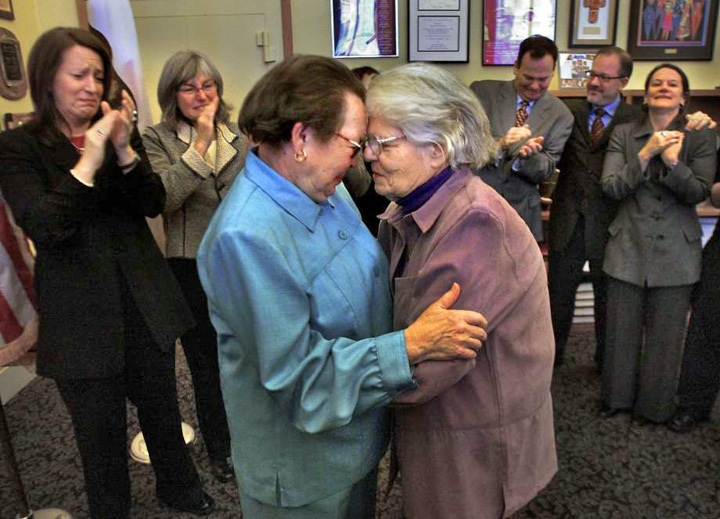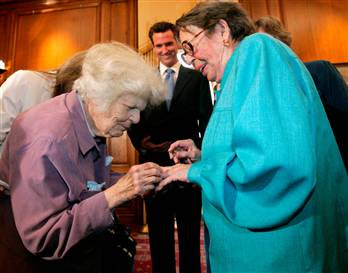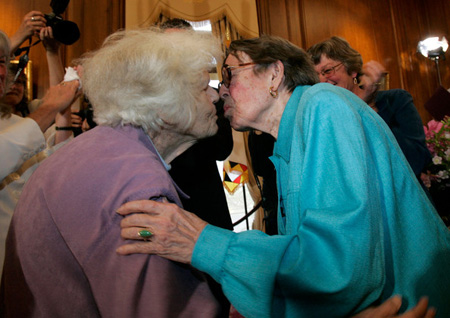Just Married, After 51 Years Together
Activist Gay Couple Accepts Leading Role
SAN FRANCISCO — The bride on the left wears a lavender pantsuit. The other bride carries a gold-chained purse. As the music starts, they begin making their way toward the stage. They walk slowly, not because they want to, but because this is how they walk at age 83 and 79. The white-haired one in lavender is Del Martin. The one with coral lipstick is Phyllis Lyon. They are arm in arm.
A crowd of 2,000 in the Hyatt Regency Grand Ballroom presses toward the velvet ropes, cameras flashing, everyone craning to get a glimpse. Flowers are tossed. Fists are raised.
“That’s them,” someone shouts.
“ROCK ON,” another yells.

The reception is for gay couples married in San Francisco’s renegade wedding blitz at City Hall. Held this past week, the reception is attended mostly by women. Some are old enough to remember police raids on lesbian bars. Others are young enough to link their political awakening to when comedian Ellen DeGeneres made the cover of Time. All are here to pay homage to the two figures now coming up the wedding aisle. As the emcee shouts, “the founding mothers of our movement, Mrs. and Mrs. Phyllis Lyon and Del Martin!”
They have been together for 51 years. When the two longtime activists agreed to be the first same-sex couple to get married in San Francisco after Mayor Gavin Newsom decided to let gays obtain marriage licenses, the couple understood perfectly their role as chess pieces in a larger strategy.
What they couldn’t predict is what followed. City officials in New Mexico and New York began issuing marriage licenses to gay couples, Chicago’s Mayor Richard M. Daley announced his support of gay marriage, and a backlash spilled into courtrooms, state legislatures and the Capitol. President Bush called for a constitutional amendment banning gay marriage, and with the issue in the news, support among Americans for a ban has grown almost 10 percent, recent polls show.
For many, Lyon and Martin symbolize the desecration of something sacred and an affront to the law. In 2000, voters in California approved a ballot measure that strengthened the definition of marriage as between a man and a woman.
 “There are lots of old ladies who are friends, but they don’t have the right to turn marriage upside down,” said Randy Thomasson, executive director of Campaign for California Families, one of two conservative groups suing San Francisco’s mayor to stop the marriages. “This was all done to victimize marriage, voters and state law.”
“There are lots of old ladies who are friends, but they don’t have the right to turn marriage upside down,” said Randy Thomasson, executive director of Campaign for California Families, one of two conservative groups suing San Francisco’s mayor to stop the marriages. “This was all done to victimize marriage, voters and state law.”
Old ladies. Together for half a century, married for 12 days. Slightly stooped and hard of hearing. Statistically, they have survived what most heterosexual marriages have not, and with none of the same legal protections.
At the wedding reception, their silvery heads bathed in camera lights, Lyon and Martin finally reach the stage. Someone helps them up. They are led to a pair of red chairs, where they settle, at last. They look out across the ballroom. They see people crying. Balloons floating in air. Hundreds of new wedding rings gleaming on hands that raise champagne glasses. Lyon and Martin see something they never expected to see in their lifetimes.
As chess pieces, they have made their boldest move. Now the question is whether their final act will propel the movement forward or slow its rush of progress.
An Obvious Choice to Lead
There was never any question who would be first.
On Feb. 11, Kate Kendell, executive director of the National Center for Lesbian Rights, telephoned Lyon and Martin at home. “This will hopefully be the last thing the movement will ever ask you to do,” Kendell said, “but do you wanna get married?”
To push the argument to the furthest frontier, it had to be them. Their activism on behalf of lesbians and gays spans five decades. Their relationship is in contrast to the philandering, free-love stereotype suggested by the opposition. They drive a Honda. They get their hair done.
On Feb. 12, Lyon and Martin were married in San Francisco’s City Hall. Since then, 3,428 same-sex couples have followed, and so has a legal battle to stop the marriages, with upcoming hearings in both Superior Court and California Supreme Court.
 As lifelong feminists, Martin and Lyon were never particularly interested in the institution of marriage, but times change, and they go where the fight is. And yet getting married transcended the merely political: When they were pronounced “spouses for life” in the closed-door ceremony at City Hall, both women wept.
As lifelong feminists, Martin and Lyon were never particularly interested in the institution of marriage, but times change, and they go where the fight is. And yet getting married transcended the merely political: When they were pronounced “spouses for life” in the closed-door ceremony at City Hall, both women wept.
Getting them to admit the enormousness of their roles — as the first names on a lawsuit that could one day end up in the U.S. Supreme Court — is not easy. “We didn’t really think too much about it, did we, honey?” Lyon asks Martin, a note of mischief in her voice.
The women are considered such astute political creatures that elected officials have climbed the steep set of stairs that lead to their modest, one-bedroom bungalow in the Noe Valley neighborhood overlooking San Francisco. Inside, books line the walls. A sketch of Eleanor Roosevelt hangs next to a photo of Shirley Chisholm. Stacks of videos — “Inherit the Wind,” a Jack Benny collection, “My Big Fat Greek Wedding” — are endless. There is a cat-scratching tree, but the cats are now gone.
Martin, with a shock of white hair and deep-set blue eyes, has a 62-year-old daughter from an early marriage that ended in divorce.
Because her hearing is fading, she is often a beat behind in conversation. Before the wedding reception at the Hyatt Regency, she passed the time reading a copy of the California Constitution. Lyon is spry and animated. Large tortoise-shell glasses sit on her nose. She does not like the word “queer.” Neither of them has seen “The L Word” because they don’t have cable. And yet above the TV is a black-and-white nude photograph of a woman lying on her side, leaving little mystery about their sensibilities.
They met in 1950 when both worked for a trade publication in Seattle called Pacific Builder and Engineer. Martin carried a briefcase. Lyon was riveted. Three years later, they moved to San Francisco and set up house. While pulp paperbacks of the day preferred euphemisms such as “The Unfortunate Flesh” or “Warped,” Martin and Lyon opened a joint checking account.
They were occasional visitors to Mona’s and the Paper Doll, but the lesbian bars were vulnerable to police raids. Along with six other women, they formed a social club called Daughters of Bilitis. The name was a reference to a Sapphic love poem. After a year, Martin and Lyon grew restless with the limitations of a secret social lodge and decided to take Daughters of Bilitis in a political direction. By the early 1960s, nearly 200 Daughters of Bilitis chapters had formed around the country.
In 1964, Martin and Lyon helped found the Council on Religion and the Homosexual, an organization that taught clergy members about gay behavior. They campaigned to remove homosexuality from the American Psychiatric Association’s diagnostic manual of mental disorders.
“They were more revolutionary than radical,” says Washington filmmaker Joan E. Biren, whose documentary, “No Secret Anymore: The Times of Del Martin and Phyllis Lyon” was released last year. “It’s an important distinction: They wanted equality within the system they respected.”
Lyon had her individual interests, such as starting the National Sex Forum in 1968. And Martin had hers, publishing “Battered Wives,” one of the earliest books on domestic violence. Working as a team, they magnetized each other’s energies in ways that helped sustain their relationship.
Fidelity was their path. Martin was square-jawed and handsome, Lyon a quick wit with a string of pearls. “We knew that people were falling for one or the other of us,” Lyon says. “But we were too busy to run around and have affairs. We just stayed the course.”
“We love each other,” Lyon shrugs. “That helps.”
“Plus,” Martin says, “we like to do the same things.”
Like what?
They turn toward each other. “Organize,” Lyon says, cracking up.
Which is exactly what their actions have spurred defenders of traditional marriage to do. The day after the mega-wedding reception at the Hyatt, six protesters are across from City Hall, holding signs that read “GOD HATES FAGS” and “FAGS ARE LAWLESS.” The group is from Westboro Baptist Church in Topeka, Kan., led by anti-gay activist Fred Phelps Jr.
“Homosexuals are lawless,” Phelps says, gesturing to the line of gay couples. “The law means nothing to them.”
Political and Personal
On the morning President Bush announces his endorsement of a constitutional ban on same-sex marriages, City Hall is open for business. An automated voice calls out numbers.
“Now serving, AOO8.”
“Now serving AO11.”
“Now serving C420.”
Bush declares that “marriage cannot be severed from its cultural, religious and natural roots without weakening the good influence of society.” Within hours, the backlash to the backlash begins. A florist arrives with 40 bouquets sent from anonymous supporters across the country. Each card says, “To any gay couple, C/O City Hall, San Francisco, CA.”
Bill Jones is one of the deputized marriage commissioners working in the rotunda where the couples get married. White-haired and 75, holding a clipboard, he approaches two women waiting their turn at the velvet ropes. They have driven from Las Vegas in a 1999 Chevy Cavalier. They are dressed in sweat suits, accompanied by five family members, including a niece in pigtails and Sunday school dress. Jones leads them to the center of the rotunda. “I know what you’ve been through, but it’s going to happen,” he tells the women. “I’m going to marry you.”
He looks down at his clipboard. “Okay, we have Ella Louise Johnson and Erma Jean Daniels.”
Johnson, 46, is clutching a small jewelry box. She takes the hand of Daniels, 51.
“Ella, will you stand on my left?” Jones says. “Now, how long have you been together? Fifteen years? And I see you’re from Las Vegas. I’m glad you didn’t have an Elvis impersonator perform your wedding.”
The tension is broken. Jones begins, reciting the words from memory. “The contract of marriage is most solemn and is not to be entered into lightly, but thoughtfully and seriously with a deep realization of its obligations and responsibilities. Please remember that love, loyalty and understanding are the foundations of a happy and enduring home.”
He pauses and continues. “No other human ties are more tender and no other vows more important than those you are about to pledge. Please face each other and join hands.”
The women are trembling.
“Do you, Ella Louise Johnson, take Erma Jean Daniels, to be your spouse for life?”
Johnson’s gaze is steady. “I do.”
The marriage commissioner continues. “Do you promise to love and comfort each other, honor and keep each other in sickness and in health, for richer and for poorer, for better or for worse, and be faithful to each other as long as you both shall live?”
“I do.” The gold ring slips on.
“By virtue of the authority vested in me by the State of California and the City and County of San Francisco, I now pronounce you spouses for life.”
Shyly, the women kiss. The marriage commissioner goes off to find his next couple.
Upstairs on a balcony, another couple has just been married, only they look more like the illustration on the Department of Health Services pamphlet given to all newlywed couples: a man wearing a suit and a woman wearing a dress.
Mike McFetridge, 32, and Nora Lusterio, 34, from Montreal, made their appointment months ago to get married in San Francisco. The experience was not what they imagined. As they stood on the sidewalk outside City Hall with mostly gay couples, a blood-curdling yell came from a passing car: “FREAKS!”
Now McFetridge stands beside his new bride, glad to be part of this moment. He peers down at three sets of gay couples exchanging vows in the sweeping rotunda. “It’s ironic,” he says. “We’re sort of eloping. They are not eloping. They’re just trying to duck under a wire.”
McFetridge and Lusterio head to the recorder’s office to register their license, passing the two women from Las Vegas. The women are wearing sweat suits because they awakened in their hotel room to President Bush calling for the constitutional ban on same-sex marriage. They raced to City Hall. They have their license. Ivory-colored, embossed and notarized.
“It’s all worth it for this one moment I just had,” Johnson says, standing on the marble. “Ever since I was younger, I just wanted to be married. Erma’s one of the most beautiful people I’ve ever met. She is so understanding. She can deal with me. She has my heart.”
‘Never a Right Time’
Del Martin and Phyllis Lyon listen to the president’s announcement on the radio. Twice, he mentions San Francisco. Their role is implicit. The phone rings all day. Lyon does a crossword puzzle while Martin goes around the house purposely without her hearing aid. The wedding bouquets in the living room are still alive. The country is up in arms.
“There’s always going to be backlash,” Lyon says, resolute. “If you wait for the right time, there’s never a right time.”
For them, getting married is no more extreme than organizing Daughters of Bilitis at the peak of the McCarthy era, when newspapers carried headlines such as “Federal Vigilance on Perverts Asked.” Their marriage license sits on the coffee table in a blue folder.
California law states what they have is not a marriage. No matter how it seems.
“We really only had problems our first year together,” says Lyon, referring to 1953. “Del would leave her shoes in the middle of the room, and I’d throw them out the window.”
From her recliner, Martin chimes in. “You’d have an argument with me and try to storm out the door,” she says. “I had to teach you to fight back.”
“We didn’t have counselors for us back then,” Lyon explains. “Besides, it’s a fairly simple thing. Respect the person, have patience.”
Martin interrupts. “Or, if you do get into a fight, fight fair.”
Lyon turns to Martin. “You already said that.”
“What?” Martin asks.
“Never mind,” Lyon says.
Everything has changed, but nothing has changed. At night they sit at the kitchen table as always, playing cards, Lyon with a drink and Martin with a nonalcoholic beer. A Safeway frozen dinner-for-two bakes in the oven. They turn the cards over in their elaborate game of solitaire, the lights of San Francisco twinkling beyond their picture window. Across the country, the war over same-sex marriage is just beginning. The oven bell rings, and dinner is ready.
Washington Post
Anne Hull, Washington Post Staff Writer
February 29, 2004